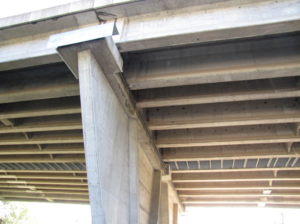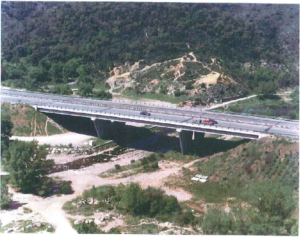Monitoring cracks, recalculation and inspection of the VIPP Reyran viaduct
The Reyran viaducts is an independent-span viaduct made of post-tensioned prestressed beams (VIPP) located on the A8 motorway at PR (point repère or reference point) 138+100 (OA, or engineering structure, 1381), connecting Aixen-Provence and Nice. This three-span structure has two unconnected decks, one per direction of travel, and was built in the early 1960s then widened in 1990. The widening was secured using prestressed tubes.
The existing structure is part of the generation of VIPPs built before 1965, whose technology is rather deficient in the following respects:
- Poor – even inexistent – injection into the conduits,
- Absence of watertight membranes,
- Use of prestressing steel susceptible to cracking under pressure or to hydrogen embrittlement,
- Insufficiency of vertical stirrups at the extremity of beams in areas of shear force,
- The very low percentage of longitudinal passive reinforcements,
- Lack of structural ductility before fracture.
Client & Project Manager
Principal features
Recalculation of a VIPP-type deck, complete modelling of the structure, carrying out checks under normal and tangential forces. Checking existing framework by radar inspection in situ. Specific monitoring of particular cracks.
- VIPP with three independent spans of 32m, 40m and 32m.
DIADES’ task

ESCOTA tasked DIADES with carrying out a general diagnosis to include:
- Annual monitoring of specific cracking in the beams,
- Recalculation of the structure,
- Feasibility study into the shifting of all traffic to one single deck in the event that a bridge deck suffers a load-bearing capacity problem. This task is additional to the task relating to the replacement of a deck by a mixed isostatic bridge in the event of a load-bearing capacity problem in one of the existing decks.
These tasks revealed defects in the reinforcements, such as the shearing force in the beams and the cross struts.
A targeted program of inspections of the existing framework was then carried out by radar location in order to check the structural insufficiencies prior to starting the reinforcement plans.




